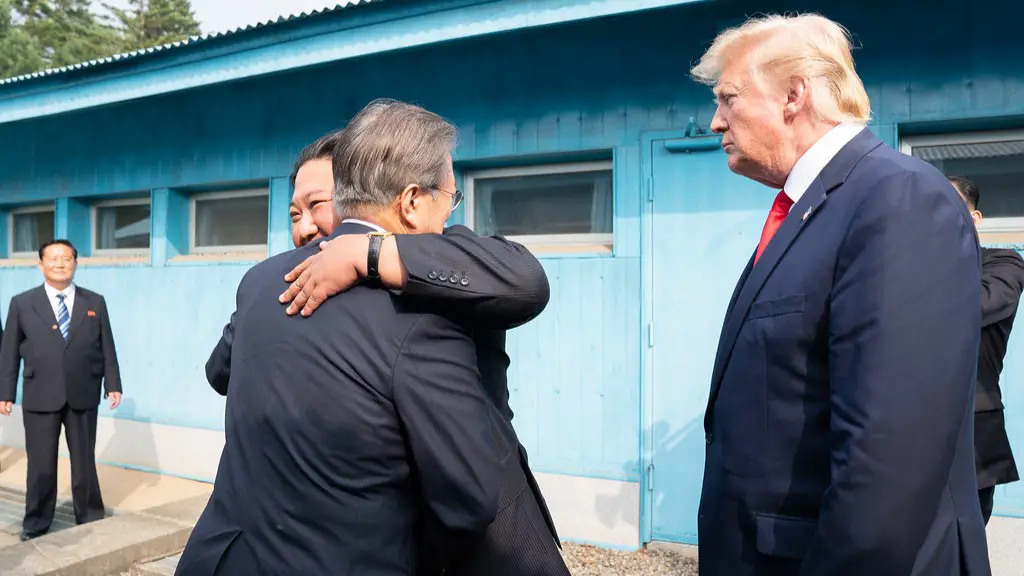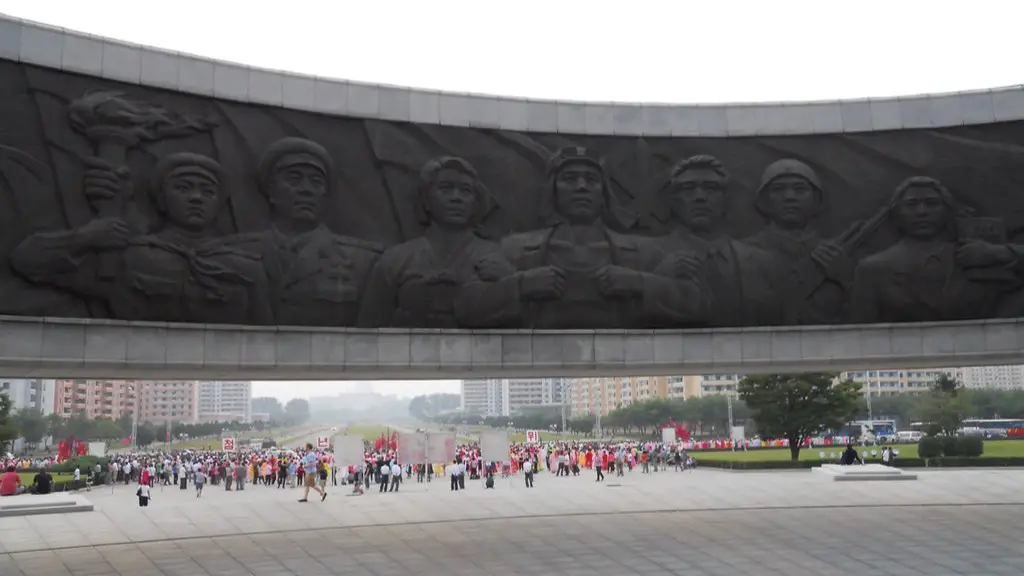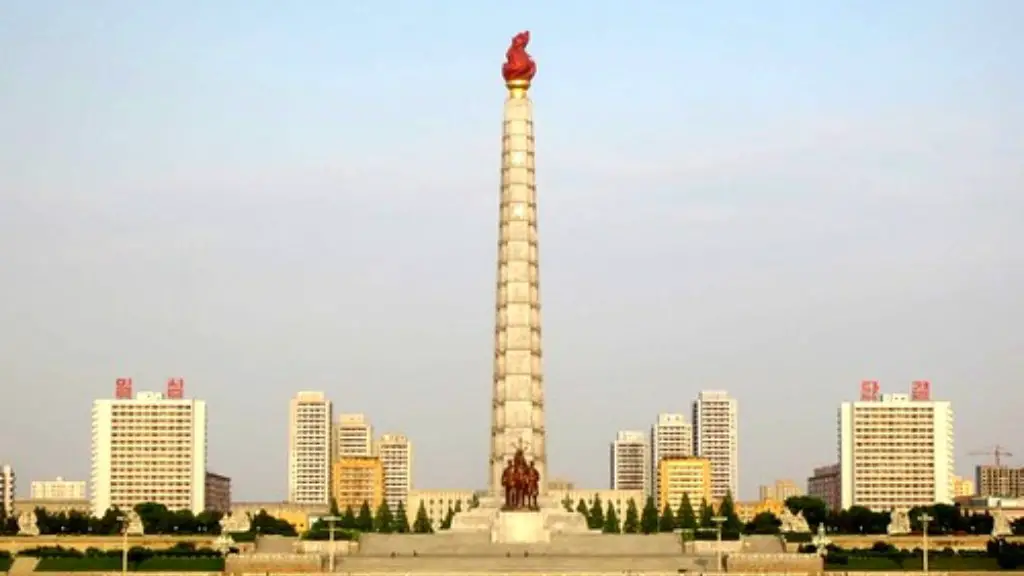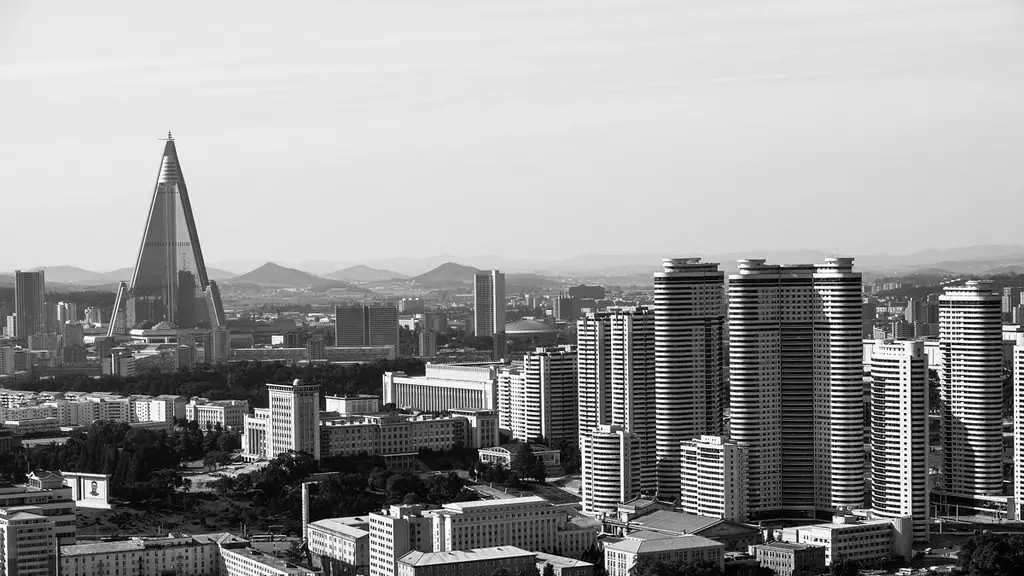As the world watches uneasily, one question on everyone’s mind is: Could North Korea be on the brink of a revolution? With its leader, Kim Jong Un, being a provocateur of global norms, the country always seems to be on the edge of regional turmoil. To answer this question, we need to assess the general sentiment within North Korea, as well as consider the hardships of the North Korean people, recent defections by key figures, economic hardships, and the increasing tensions between Pyongyang and the United States.
Though the situation in North Korea is one shrouded in secrecy and draconian control, recent defectors and repatriations have shed light on the internal state of the country. It is widely known that the ruling Kim dynasty relies heavily on its internal security networks such as the Ministry of People’s Security and the Workers’ Party to maintain tight control over its citizens. Moreover, the inhumane punishments meted out to those that fail to obey the country’s laws have been well documented, with public executions and harsh labor conscription being commonplace.
As for North Korean citizens themselves, their suffering is often forgotten or neglected. Reports speak of widespread poverty, malnutrition, and even starvation in some parts of the country. This has been accompanied by an extensive system of state surveillance that restricts its citizens from communication with the wider world. To make matters worse, the United States has been stepping up economic sanctions against the country, leading to further hardship and deprivation of basic necessities. These factors have caused a surge of discontent among the people, and many have made calls for reform.
Unfortunately, the North Korean Government has become even more oppressive of its people in an effort to stifle these calls for change. But its control over the population appears to be waning. Recent defections of key government figures, such as Thae Yong-ho and Hwang Jang Yop, as well as a decline in loyalty towards Kim Jong Un and his government, suggest increasing discontent among its citizens. Moreover, the increasing number of North Koreans choosing to defect to South Korea is indicative of the sense of desperation that many North Koreans are feeling.
The future of North Korea is unpredictable. But, for any revolution to take place, people must have a platform or channel through which to express their dissent and discontent. This is impossible in the current authoritarian state. In order for a revolution to take place, the ruling Kim dynasty needs to initiate reform and actively encourage its citizens to take part in civil discourse and engage in the political process.
Human Rights Abuses
It is no secret that the people of North Korea suffer from severe human rights abuses. Freedom of speech and assembly are severely restricted and criticism of the government is not tolerated. Political prisoners are often detained and held in inhumane conditions in labor camps with little access to food, water, or medical care. Moreover, executions are regularly carried out as a means of maintaining control over the population. As if that was not enough, North Korea has been accused of numerous other human rights violations such as abduction and forced labor for overseas workers.
Given this, it is not surprising that the North Korean people have become increasingly vocal about the injustices and violations of human rights that they experience on a daily basis. Furthermore, activists from countries such as South Korea and the United States are working to increase awareness of the situation in North Korea, by highlighting the severe restrictions on civil rights and liberties that the country’s inhabitants face. This has helped to drive an international movement to help bring about change in North Korea.
The fact that many North Koreans are now beginning to speak out against the regime suggests a growing sense of dissatisfaction and rebellion. However, the country’s security forces remain powerful and are quick to crack down on any hint of civil unrest. The recent public executions of high-ranking officials, who were tolerated while in power, demonstrate just how seriously the regime takes any perceived dissent.
Given this, it is hard to envision a situation in which a full-scale revolution would be successful. Even if there were an uprising, it would likely be brutally suppressed before any momentum could be established.
Impact of Sanctions
The United States has targeted North Korea with increasingly harsh economic sanctions in an effort to put pressure on the country. These sanctions were targeted at North Korean industries, such as coal exports, and foreign banks that conducted business with the country. As a result, North Korea has seen its revenues from coal exports drop from $1.85 billion in 2015 to only $87 million in 2017.
The harsh economic sanctions have also impacted North Korean citizens as well. The sanctions have deprived the people of basic necessities such as food and medicine, and caused a spike in food prices. This has led to widespread suffering among the citizens and a sense of desperation. Sanctions are a blunt tool, and they often hurt the most vulnerable citizens of a country, and this has certainly been true in North Korea.
Though the United States insists the sanctions are necessary to pressure the regime into compliance, it is worth considering the real-world impact of these sanctions. Sanctions can only work if the citizens of North Korea accept the suffering and support the regime in the face of external pressure. If the sanctions continue to take a toll on the North Korean people, it is likely that dissatisfaction and discontent will continue to surge, potentially emboldening opposition to the regime and leading to further civil unrest.
Prospects of Change
Since Kim Jong Un came to power, there has been some effort towards economic reform. Though very limited in scope, these so-called reforms have allowed for some degree of economic activity outside the state’s control. However, the regime has remained wary of allowing too much of such activity, and has cracked down on any perceived challenge to its authority.
Despite this, some room for change has opened up, and some citizens have been empowered to take part in the economic activity of the country. The growth of private markets and businesses, as well as the emergence of a small entrepreneurial class, are signs of a shifting economy. While this does not necessarily mean that a revolution is looming, it is a positive sign for the North Korean people.
In addition, the fact that Kim Jong Un has met with South Korean officials and US President Trump could be seen as a sign that Pyongyang may be open to negotiations and compromise on important issues such as denuclearization and economic reforms. Though nothing has come of these talks yet, any talks at the highest level of government are likely to be closely followed, and could lead to progress on a number of fronts.
Lineage of the Kim Dynasty
The Kim dynasty has controlled North Korea since it was established in 1948. The current leader, Kim Jong Un, is the third leader of the dynasty and has established himself as a ruthless leader. He has continued the family’s tradition of absolute power and his regime is often characterized by human rights abuses, abuses of power, and extreme secrecy.
This has been further amplified by the recent disappearance of his brother, Kim Jong Nam, who was assassinated in Malaysia in 2017. This has raised questions about internal power struggles and hints at a possible power shift in North Korea. Nevertheless, the Kim dynasty is firmly in control of the country, and any thought of a revolution would require an organized effort from the people, something that is unlikely given the oppressive regime.
The dynasty has long been a symbol of power, with the revered Kim Il Sung maintaining his grip on the country since 1948. His son and successor, Kim Jong Il, was no less authoritarian and maintained tight control over the population until his death in 2011. Today, his son Kim Jong Un has continued his legacy, and despite economic reforms, there is no indication of any weakening of the regime’s grip over its citizens.
International Pressure
Though the tactics of the Kim dynasty have made it difficult to challenge their regime, there is potential for external pressure to be applied and force reform. International condemnation has grown in recent years, with the United Nations condemning the country’s numerous human rights violations and imposing sanctions against it.
Moreover, North Korea has been increasingly isolated from the international community. Its autocratic rule and threats of nuclear weapons have led to many countries cutting off diplomatic ties with it, and it is heavily sanctioned by multiple states. This has resulted in a complete lack of foreign direct investment in the country, and its international isolation may be one of its biggest weaknesses.
However, it is important to note that these actions have only been met with further retaliatory measures by Pyongyang. The country has significantly limited the amount of information that enters or leaves the country and is contributing to an even more oppressive atmosphere in the country. Any hope of international interference to force reform is unlikely, and the only pressure that may be applied will be economic.
A Grim Future?
Ultimately, it is difficult to see a revolution occurring in North Korea in the near future. The Kim dynasty rules with an iron grip and has managed to stay in power for decades. Though discontent is growing, the regime is both repressive and powerful and is unlikely to succumb to any popular uprising.
Moreover, the country appears to be increasingly isolated from the international community, further complicating any potential for meaningful reform. The only hope for any change appears to lie with North Korea itself, and unless the Kim dynasty is willing to open up the country to reform and negotiation, the North Korean people may be facing a grim future.





